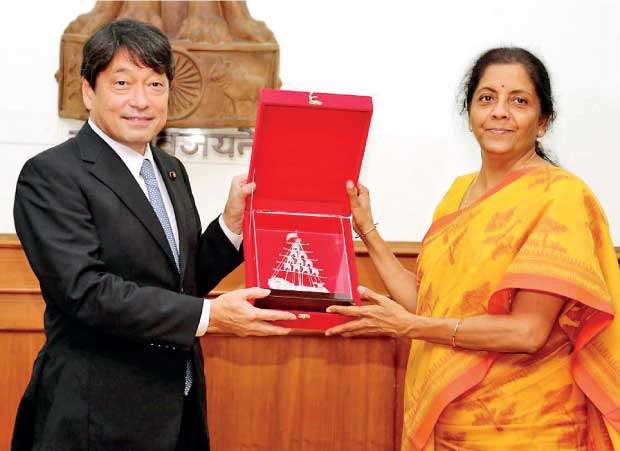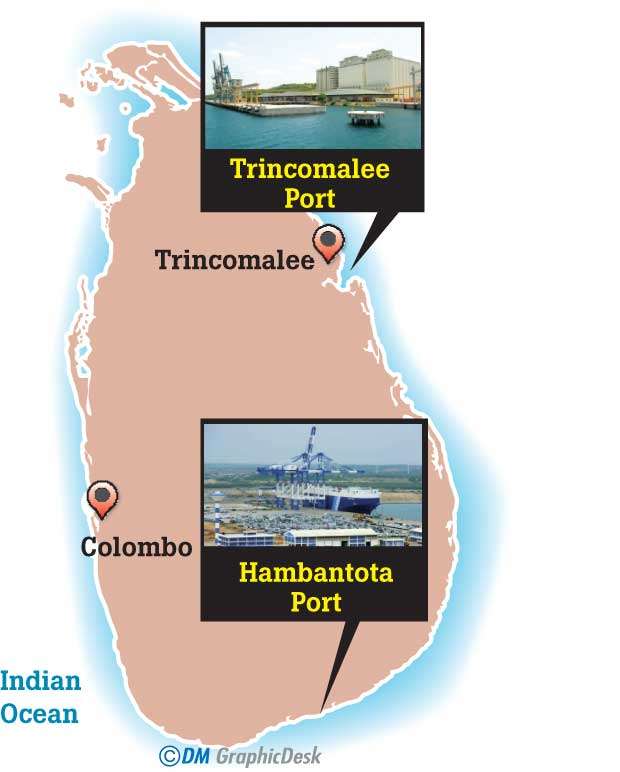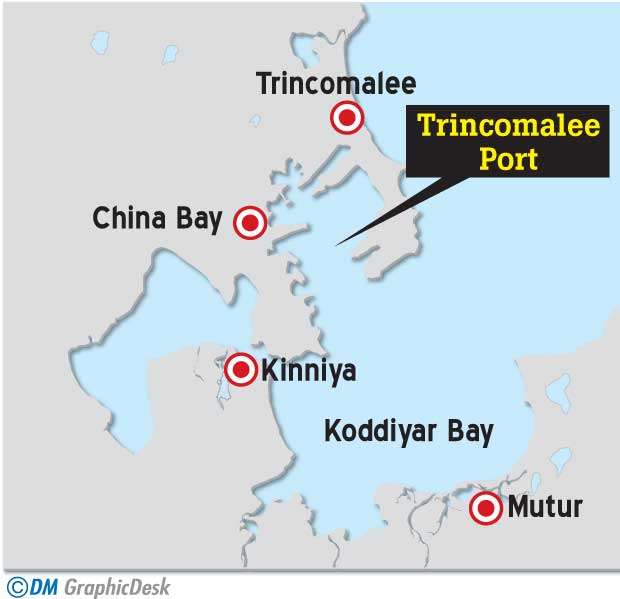Reply To:
Name - Reply Comment
Last Updated : 2024-04-26 16:02:00

Japanese Defence Minister Itsunori Onodera photographed with Indian Defence Minister Nirmala Sitharaman in New Delhi
 The visit of Japan’s Defence Minister Itsunori Onodera to Sri Lanka (Aug 20-22) has significance that goes beyond the fact that it is the first ever by a Japanese Defence Minister to this country. Onodera’s visit took the form of a tour of Sri Lanka’s major ports – Colombo, Trincomalee and Hambantota. It took place within a web of other developments internationally, pointing to heightened geo-strategic interest in the Indian Ocean region.
The visit of Japan’s Defence Minister Itsunori Onodera to Sri Lanka (Aug 20-22) has significance that goes beyond the fact that it is the first ever by a Japanese Defence Minister to this country. Onodera’s visit took the form of a tour of Sri Lanka’s major ports – Colombo, Trincomalee and Hambantota. It took place within a web of other developments internationally, pointing to heightened geo-strategic interest in the Indian Ocean region.
It is not without significance that Onodera, before his arrival in Sri Lanka, held talks with India’s Defence Minister Nirmala Sitharaman in Delhi, where the two sides reportedly agreed to start talks on an ‘Acquisition and Cross Service Agreement’. Among other measures to “counter China’s growing influence in South Asia” they also discussed preparations for the first joint exercise by Japan’s Ground Self Defence Force and the Indian Army, according to Japan Times. It’s no secret that the US, India and Japan have apprehensions over China’s investments in Sri Lanka including strategic assets like ports, roads and railways, seen as part of its ‘Belt and Road Initiative’. The status of Hambantota port in particular, after the government gave its operation to China on a 99-year lease, was followed by accelerated responses designed to counter China.
Japan depends on sea lanes of the Indian and Pacific Oceans for the import of all its energy requirements, and this has led to its vigorous promotion of a ‘free and open Indo-Pacific’ concept, endorsed by the US. On 20th August Alice Wells, US Deputy Assistant Secretary for South and Central Asian Affairs held a press briefing in Washington on ‘US Policy in the Indian Ocean Region’ where she drew attention to the US’s recently announced $300 million in security funding for the region. In this context she mentioned the US’s Bay of Bengal initiative (not to be confused with BIMSTEC) which she said “will enhance the capacity of Bangladesh and Sri Lanka to share shipping information with other partners in the region such as India…” It’s also relevant that in response to a journalist’s question, Wells remarked “… I think one of the great new elements of our relationship with India is that we are working in third parties and third countries.”
It would seem that all of these developments taking place around the same time, are too much of a coincidence to be a coincidence. The visit of a Japanese warship to Trincomalee port during Onodera’s visit, was followed by the arrival of the amphibious transport dock USS Anchorage - part of the US 7th fleet - in Trincomalee, for a visit that included exercises with the SL Navy and Marines. The strategic motives behind frequent US naval ship visits to Sri Lanka’s ports were laid bare in the remarks of the US embassy’s Charge d’Affaires Robert Hilton who said: “We’re also excited to try out the air logistics hub concept which utilizes Sri Lanka’s strategic location in the Indian Ocean to ensure the quick availability of relief supplies, equipment and other material when needed by the U.S. and partner militaries and humanitarian organizations.” The military overtones though not explicit, were clear.

The fear that China will use Hambantota as a military base persists, in spite of assurances to the contrary from both Sri Lanka and China. This was obviously the concern underlying Onodero’s remark to NHK World:“Despite China’s long term lease, it is internationally acknowledged that the port should be free and open to the public.”
Questioning the assumptions behind this comment Admiral (Prof) Jayanath Colombage, Director of the Centre for Indo-Lanka initiatives and Law of the Sea at the Pathfinder Foundation asked “Why should someone tell us what to do? We are an open country, we welcome (ships from) all. None of the Sri Lankan ports should be used by anyone for military purposes.” Pointing out that in the period 2009–2018 warships from no less than 27 countries visited Sri Lanka, the former Navy Commander asked “What is meant by ‘military purposes?’ If a ship calls in a port for fuel, water etc it’s not military but a goodwill visit. If they come to act against another country, that is military” he said. “We welcome anyone, only they shouldn’t come with the intention of harming anyone, especially India.”
Against the backdrop of a fast changing external environment, how well have Sri Lanka’s political leaders and policy makers steered the course? Regrettably, rather than skillfully balancing diplomacy with economic and defence priorities, the government appears to be trying to set off investment opportunities given to one foreign power against concessions granted to another, in an ad hoc manner, lacking any consistent policy designed to serve the national interest. “Sri Lanka tried to allay New Delhi’s fears over Hambantota by entering into a joint venture with India’s airports authority to lease out the Hambantota international airport to manage it,” said a PTI report, reflecting this perception.
Colombage warns that strategic assets like ports, airports and roads “should not be given to country A, B or C.
They should be developed as joint ventures or with foreign direct investment but their ownership should be with Sri Lanka.”
The downplaying of Onodera’s visit to the Trincomalee Oil Tank Farm – which was not mentioned as part of his itinerary in any of the official statements - is another puzzle. More so because this site has historical significance. In the course of World War II,on 9th April 1942 one of the tanks was hit and completely destroyed by Japanese kamikaze suicide pilots, during an attack on Trincomalee naval base in which hundreds of airmen are said to have been killed. The oil tank farm is “the largest tank farm in South Asia and of great strategic value as it falls between West Asia and Singapore,” according to a 2013 PTI report. The use of the remaining 99 tanks, in which India has a partial stake, has also been subject to some controversy.

At a time when the defence dimension has become inextricably entangled with Sri Lanka’s infrastructure development involving strategic assets, the assertions by some government ministers that Onodera’s visit had ‘no defence or political’ aspect, sound disingenuous. The Trincomalee leg of his tour - handled by the SLN and not the Sri Lanka Ports Authority - clearly had a defence dimension, buttressed by the Japanese ship visit during the tour. Defence cooperation and maritime security were key elements in the statements by President Sirisena and Prime Minister Wickremesinghe following their meetings with the Japanese Defence Minister. The PM’s statement in fact started with reference to the importance ‘developing defence ties’ and an ‘MoU on Defence’ (‘avabodataa givisumak’). It may be inferred that any such agreement would be consonant with US and Indian objectives in the region.
The efforts to deflect attention away from Trincomalee, the most strategically important stop in Onodera’s tour, only give rise to more speculation as to whether a defence agreement was discussed. Instead of blaming media for carrying misleading reports, the government would do better to demonstrate transparency regarding agreements it reaches, or hopes to reach, with other countries, no matter whether they relate to trade, investment or defence.

Add comment
Comments will be edited (grammar, spelling and slang) and authorized at the discretion of Daily Mirror online. The website also has the right not to publish selected comments.
Reply To:
Name - Reply Comment
US authorities are currently reviewing the manifest of every cargo aboard MV
On March 26, a couple arriving from Thailand was arrested with 88 live animal
According to villagers from Naula-Moragolla out of 105 families 80 can afford
Is the situation in Sri Lanka so grim that locals harbour hope that they coul